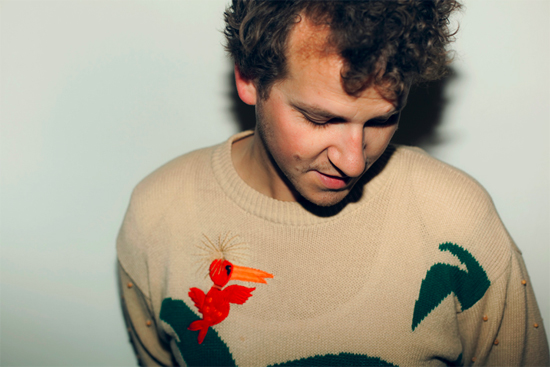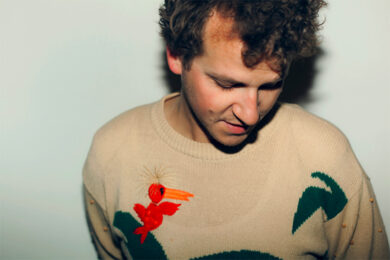Frisk Frugt is the solo project of Berlin-based, Copenhagen-raised Anders Lauge Meldgaard, an experimental artist whose album Dansktoppen Møder Burkina Faso I Det Himmelblå Rum Hvor Solen Bor is a veritable pop smorgasbord of percussion, samples, song snippets and passages of free improvisation. It’s a dizzying collage of sound, an album almost without any recognisable structure and indicative of Meldgaard’s innate curiosity and desire to explore.
The record – the title can be roughly translated as ‘Danish Folk Meets Burkina Faso In The Sky Blue Place That Is The Home Of The Sun Suite’ – was inspired by at trip Meldgaard made to West Africa in 2009. Released in Denmark a year later (and given a Europe-wide release last month via Exotic Pylon), Dansktoppen Møder… was subsequently nominated as one of the albums of the year at the By:Larm music conference in Oslo (a sort of Scandinavian equivalent to the Mercury Music Prize.)
Anders isn’t your average musician. Having originally studied jazz saxophone, he was part of Danish art collective Yoyooyoy and has been making experimental music since 2000. When he’s not working under his Frisk Frugt (‘Fresh Fruit’) moniker, Meldgaard builds his own mechanical musical instruments and also oversees the Plant Orchestra – a project which explores the notion that plants can influence sounds.
When the Quietus recently spoke to Anders, he’d just returned from Copenhagen where he’d spent the previous month sat in an archive researching Danish folk music. Even during our brief 40-minute chat, Meldgaard exudes an endless thirst for new experiences and knowledge. The possibilities for his Frisk Frugt project appear both limitless and uncoupled from convention – and that, set against an industry hell-bent on common-denominator throughput, is a mightily heartening proposition.
The album was inpsired by your visit to West Africa. How did the trip come about?
Anders Lauge Meldgaard: It stemmed from being very curious. I had been wanting to go there for a long time because of my interest in African music – and folk music from different countries. I found stuff on the internet and on records and was curious by music that was created outside of the Western music market. I really enjoy listening to field recordings – like when you hear a small tribe playing drum music – which is a totally different approach to making music. In 2009, I finally got the chance to travel to Mali and Burkina Faso.
How long was the trip? Where did you stay in Burkina Faso?
ALM: I went for two months. In Burkina Faso, I stayed in the capital city – Ouagadougou – with a private family. It was a great experience as I got close to everyday life in a poor part of the city. We told the family that I was very interested in music so we started to hang out with some local musicians. They had a band whose name translated as ‘Solidarity’ and I would watch them rehearse. I went into the studio once with some of these guys to try and record some music in Africa as an idea for a new album, but the recordings did not end up on the album. It was difficult, as my French is not so good, so it was hard to communicate. My idea was to get some basic things recorded and build on them myself when I got back to Europe. That didn’t really work – when they strated playing it sounded great but it was complete music so there wasn’t much to work with. The session is still on my hard disk somewhere.
What was your time in Mali like?
ALM: In Mali, I stayed with the famous kora player Toumani Diabaté for a couple of weeks. It was a funny experience. He had a lot of students hanging out with him, building instruments all day and playing music. He’s almost like a mafia boss or something – he has a lot of money compared to the standards of Mali. He has a huge car and three wives and a house for each wife. In the place I stayed, that particular wife was pretty pissed off most of the time with him for only being there for a third of his time. Staying there was a quite interesting cultural experience.
What was it that you found – artistically – during your African sojourn?
ALM: Well, most of my time has been spent making experimental, improvised music and I was really fascinated by the way the music in Africa was more connected with dancing. It had very strong rhythms – one thing is to hear a record and it is another thing to be in an African country and watch the people play. It made a big impression to see that and I started getting ideas about how to connect this energy and rhythms and combine it with what I was already doing myself. I didn’t want to make African music; I wanted to try and work with these different elements. When I came back it was about thinking about these inspirations and the feelings I got by going on such a journey.
What did the African musicians make of you?
ALM: I played them some of my recorded music and they were really laughing – they thought it was very funny. It sounded very weird to them. I tried to get them to play some improvised music without a strict rhythm but they found that very difficult. They had a fixed definition of what music is and how it should be played and they were extremely good at doing that. I’d love to go back and play the album to them.
So, on your return from Africa, did you have a vision for how you thought your subsequent recordings might sound?
ALM: I didn’t set out with any kind of definition; I was more going with the flow. I am really bad at having a clear idea before I start on a song. This record tended to be a lot of work, trying out different ideas and combining it with the inspiration I got from Africa.
What is your musical background? Are you classically trained?
ALM: No – I used to study the saxophone in a jazz context. I played a lot of free improvisation and experimental music. In Copenhagen, we had this collective called Yoyooyoy – we were a bunch of friends who made music together in an experimental manner.
Your music is hugely dynamic and seems to pull from multiple sources. You are clearly not writing classic verse-chorus-verse chorus songs – how do you begin to compose a new track?
ALM: The stuff on this album is almost like a collage. I’d recorded a lot of material and I started to edit it but it is often combined with a more compositional style – maybe a melody or some lyrics. Sometimes I will record something without knowing where it is going and then combine different sections together. Some songs are more straight up but I then try to arrange them in an interesting way.
With these seemingly endless possibilities, how do you know when a song is ‘done’?
ALM: That’s also a very slow process, especially for this album. I made most of it on my own and it is often much easier to work out stuff if you are with people as you can discuss things. So, on my own, it took a long time to work out when songs were finished. In theory it could go on forever, but it is always about trying to get the song into a place where it reflects what I was trying to express. It’s a very emotional thing and hard to explain. You just have a feeling that it is finished.
Did the By:Larm nomination take you be surprise?
ALM: It did. That was quite surprising and also quite funny because there weren’t many reviews in the Danish press. All of a sudden the nomination happened and all these reviews appeared. It went from nothing to be like an overnight sensation. It was really weird to me and not what I expected. The reviews were good, in general, but as for [how] the public [reacted to the album] I don’t know. Some of my friends like the record and some of them don’t.
I get the impression that continually exploring new ways to make music is hugely important to you, as opposed to becoming famous per se. Am I correct?
ALM: Yes, and I hope I will remain being curious [about music] as a lot of good energy comes that way. Also, when I go to a venue and see a band playing it is nice, but I really like the idea of playing music in more intimate surroundings where it is closer to people. I guess that is more connected to the whole idea of folk music – music played between people at an eye-to-eye level. It’s not about having a huge stage with a rock star doing his thing. It’s about people being together and I’d like to work with that idea.
I believe you have another project called the Plant Orchestra, which sounds intriguing from a botanical view. Can you tell me a little more about it?
ALM: The Plant Orchestra is a work-in-progress. It’s the idea of connecting tone generators and controlling them by plants – it’s a kind of biodynamic feedback circuit where the plant is in the same room as a synthesiser and then it can listen to sounds that it is influencing. There have been many experiments around playing music to plants and seeing how they react – they can grow quite differently depending on the type of music. So, I’m seeing that if a plant can be influenced in music, what would happen when the plant is able to influence the sounds it is exposed to – and completing a feedback circuit. I want explore the possibilities of what the plant can control.
I believe you make your own instruments. How complex do they get and why do you undertake such a task?
ALM: Well, I’ve built my own small organ because I really love the sound of an organ but playing in a church is difficult as it is loaded with cultural sensitivities and all kinds of meanings. I have a project around taking the organ out of the church and playing it in the streets or a concert hall. The building of the organ was quite complicated as it involved electro-magnets and used a wind-blower and needed to be airtight, so it was quite tricky.
I enjoy the process of searching for new sounds, so it is inspiring for me to work on building new instruments, which become unique, and you can get personality into the sounds. It’s the opposite of going to a music shop and buying a keyboard with the same 256 sounds as all the other people who buy it.
How about the next Frisk Frugt album – will you be travelling again in search of inspiration?
ALM: I would love to go travelling again, maybe to Burma and the Far East. That would be really inspiring and interesting to experience music in a different cultural setting. But, recently, I realised I knew nothing about Danish folk music so I have just been sitting in an archive in Copenhagen for a month doing some research on folk music. So, I kind of have a feeling that the next album might be a little more domestic. However, I also have the idea that you can explore the whole universe without leaving your living room – it’s just a matter of imagination.
The album Dansktoppen Møder Burkina Faso I Det Himmelblå Rum Hvor Solen Bor, Suite is out now via Exotic Pylon



